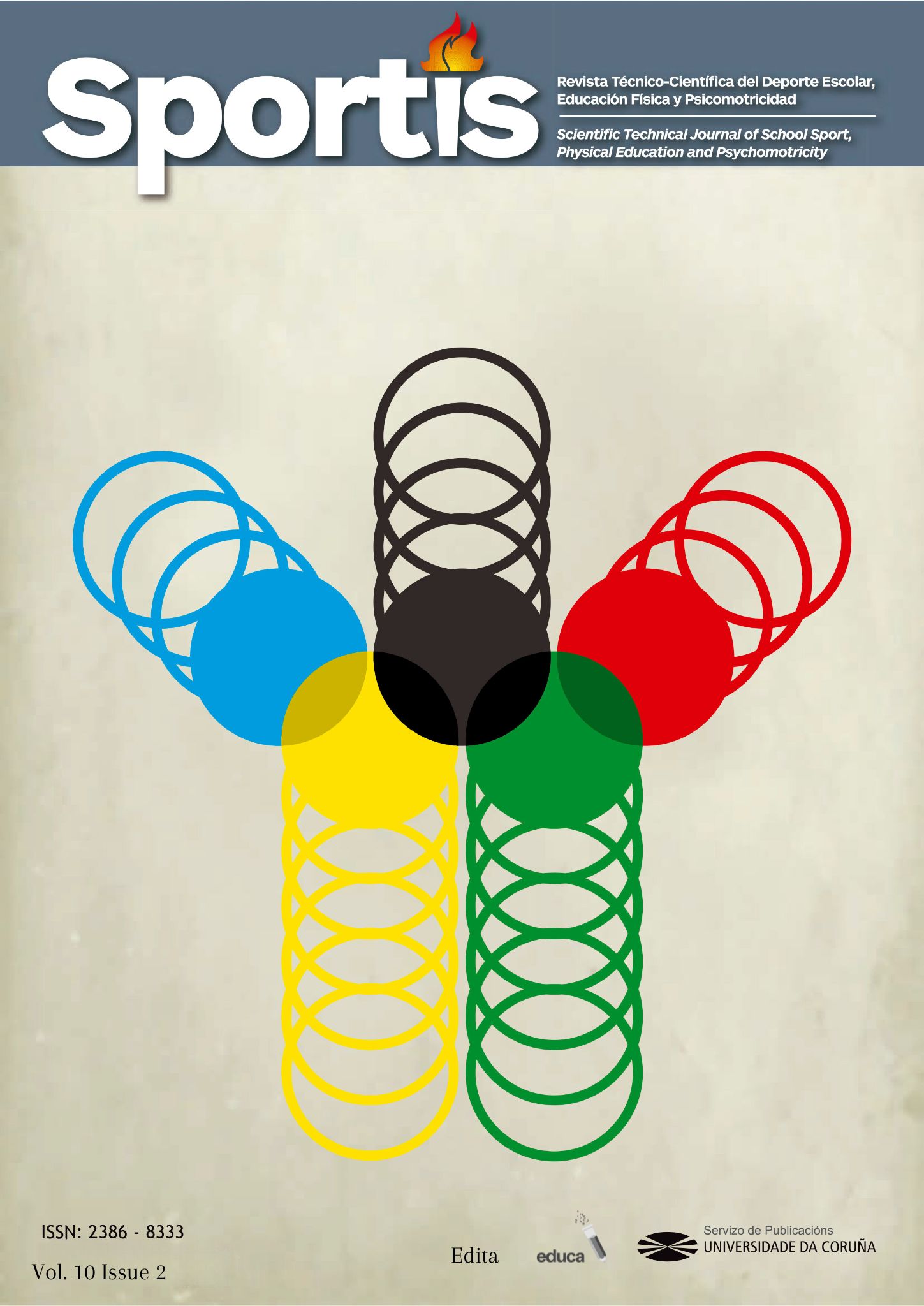Analysis of motivation for Physical Education class in primary school students
Main Article Content
Abstract
The type of motivation for Physical Education class results from the experiences that students receive from it. The objective of the study is to analize the types of motivation that students have for Physical Education class in primary school. For this, a descriptive cross-sectional study has been used. The sample was 206 participants with an average age of 10.2 ± 0.93 years, distributed among five schools in fifth and sixth grade groups. The instrument used is CMEF. The results showed that students present high levels of intrinsic motivation and identified regulation (88.3% and 82.6% respectively), introjected regulation and external regulation presented medium levels (52.9% and 73.8% respectively), while amotivation showed low levels (37.4%). The chi square statistic was applied, resulting in p< 0.05 in intrinsic motivation, external regulation and amotivation, therefore, there is a relationship between the categorical variables, that is, the school does influence these types of motivation. In the identified regulation and the introjected regulation it gave p> 0.05, so there is no relationship between the categorical variables, that is, the school does not influence this type of motivations. In conclusion, this study found that students maintain a level of intrinsic motivation, which leads to determining that they are satisfied with the Physical Education classes they are receiving in the respective educational establishments, where enthusiasm for participating in activities predominates, typical of the class.
Keywords:
Downloads
Article Details
References
Arias, L., y Vargas, A. (2024). Mejoras en el aprendizaje orientado a objetivos a través de la actividad del juego y su desarrollo en las habilidades motoras. SPORT TK-Revista EuroAmericana de Ciencias del Deporte, 13, 15.
Cádiz, P., Barrio, L., León, D., Hernández, A., Milla, M, y Sotomayor, M. (2021). Motivación contextual desde la autodeterminación en las clases de educación física. Retos, 41, 88-94. https://doi.org/10.47197/retos.v0i41.80998
Chancusig, L. (2023). La motivación como beneficio en las clases de educación física: una revisión sistemática. MENTOR Revista de Investigación Educativa y Deportiva. 2(5), 265-280. https://doi.org/10.56200/mried.v2i5.5956
Deci, E., y Ryan, R. (1985). Intrinsic and self-determination in human behavior. New York. Plenum Press. https://doi.org/10.1007/978-1-4899-2271-7
Deci, E., y Ryan, R. (2000). The what and why of goal pursuits: human needs and the self-determination of behavior. psychological inquiry, 11(4), 227-268. https://doi.org/10.1207/S15327965PLI1104_01
de Vargas-Viñado, J. F. y Herrera-Mor, E. (2020). Motivación hacia la Educación Física y actividad física habitual en adolescentes, Ágora para la Educación Física y el Deporte, 22, 187-208. https://doi.org/10.24197/aefd.0.2020.187-208
Domínguez-Hernández, D., Gene-Morales, J., González-García, R., y Pérez-Campos, C. (2021). Análisis del grado de motivación en el área de educación física relación con la teoría de la autodeterminación en periodo post COVID-19. Calidad de vida y salud, 14(2), 33-44.
García, A., y Jiménez, J. (2022). Factores que influyen en la percepción del alumnado sobre la importancia de la educación física. SPORT TK-Revista EuroAmericana de Ciencias del Deporte, 11(26). https://doi.org/10.6018/sportk.487511
Hernández-Martínez, A., González, I., Sánchez, Y., y Carrión, S. (2020). Los ambientes de aprendizaje en educación física y motivación en las primeras edades. Retos. 38, 761-767. https://doi.org/10.47197/retos.v38i38.77441
Hernández-Martín, P., Guevara, R., Urchaga, J., y Moral-García, J. (2020). Autopercepción de la motivación en las clases de educación física según el sexo, la edad, y el tipo de práctica físico-deportiva. Papeles Salmantinos de Educación, 24, 149-162. https://doi.org/10.36576/summa.132087
Leo, F., García-Fernández, J., Sánchez-Oliva, D., Pulido, J., y García-Calvo, T. (2016). Validación del cuestionario de motivación en educación física en educación primaria (CMEF-EP). Universitas Psychologica, 15(1), 15-26. https://doi.org/10.11144/Javeriana.upsy15-1.vmpe
Navarro-Patón, R., Lago-Ballesteros, J., y Arufe-Giráldez, V. (2020). Midiendo la motivación auto-determinada hacia la educación física en la escolaridad obligatoria. Revista de Psicología del Deporte, 29(4), 126-134.
Ordoñez-Bustamante, D., y Heredia-León, D. (2021). Niveles de actividad física y motivación a la práctica deportiva en estudiantes de educación física. Revista Arbitrada Interdisciplinaria Koinonía, 6(2), 504-524. https://doi.org/10.35381/r.k.v6i2.1251
Salazar-Ayala, C., y Gastélum-Cuadras, G. (2020). Teoría de la autodeterminación en el contexto de educación física: Una revisión sistemática. Retos, 38, 838-844. https://doi.org/10.47197/retos.v38i38.72729
Sánchez, A., y Chacón, R. (2021). Estudio de la inteligencia emocional en escolares de educación primaria: Alcance en el área de educación física. SPORT TK-Revista EuroAmericana de Ciencias del Deporte, 10(1), 87-94. https://doi.org/10.6018/sportk.461701
Sánchez-Oliva, D., Leo, F., Amado, D., González-Ponce, I., y García-Calvo, T. (2012). Desarrollo de un cuestionario para valorar la motivación en educación física. Revista Iberoamericana de Psicología del Ejercicio y el Deporte, 7(2), 227-250.
Tolano, E., López, L., Morales, F., y Toledo, I. (2023). Satisfacción de las clases de educación física en estudiantes de nivel primaria. En C. Favela, J. Oloño y D. Rendón (Ed), Actividad física, deporte y salud en contextos educativos (pp. 63-74). Ciudad de México, México. Cromberger.
Zueck, M., Ramírez, A., Rodríguez, J., y Irigoyen, H. (2020). Satisfacción en las clases de educación física y la intencionalidad de ser activo en niños del nivel de primaria. Retos, 37, 33-40. https://doi.org/10.47197/retos.v37i37.69027







